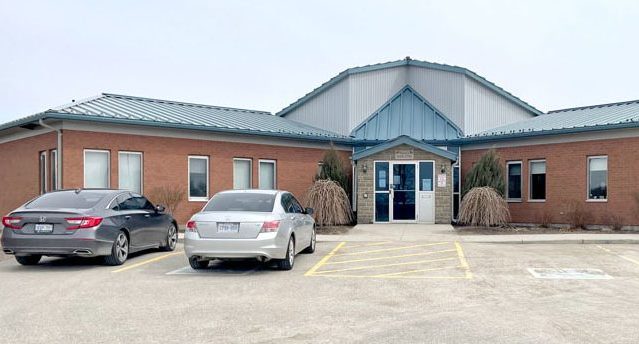MAPLETON – An animal rights advocate is asking council here to review its bylaws and align them with the Canadian Veterinary Medical Association (CVMA) code of practice for Canadian kennel operations.
Donna Powers, president and co-founder of Stop the Mills/Humane Initiative made the request in a delegation to Mapleton council on April 27.
Powers told council her organization’s goal is to raise public awareness for the plight of dogs in breeding facilities. Stop the Mills works with all levels of government to improve conditions, she stated.
“I’m not here to attack. I’m not here to fight. I want to help,” she explained.
In March, the township issued a warning to a local resident that he would be subject to fines if he continued unlicensed puppy sales, contrary to the township’s bylaw.
The action resulted, at least partially, from Powers’ efforts to draw attention to puppy mills operating in what she calls “puppy mill central,” an area including Wellington, Perth, Huron, Grey-Bruce and Dufferin counties, and the Township of Wellesley.
“When we talk about a puppy mill, it’s a high-volume, substandard breeding operation focused solely on profit,” Powers told council.
“Female adult dogs are bred continuously until their productivity falls and then they are disposed of.”
Although much of the public does not realize it, Powers said puppy mills are not illegal in Ontario, or in fact across Canada.
“But they are completely unregulated, untaxed and hidden from any meaningful oversight,” she explained.
Powers said brokers work as a middleman between the breeder and purchaser.
“A broker will go to a breeding facility and buy up an entire litter. So they’ll go and buy nine puppies, they take them away from that facility. And then they sell them, usually on a on a Kijiji-type site or a puppy-selling website,” she stated.
“The person that buys them, at that point, they have no line through to the origins of that puppy – it’s gone.”
Lack of provincial and federal legislation leaves under-resourced municipalities to regulate unlicensed puppy sales, said Powers.
“What this produces is a highly fertile ground for abuse, neglect and serious illnesses from sometimes very contagious diseases. So in the current state of commercial dog breeding, more and more breeders are using brokers; they don’t want the public coming to where they run their business,” she noted.
“I know that Mapleton does not allow brokers to operate in your municipality … this is something that I’d like to bring forward with you because there’s many brokers working in Wellington County and Mapleton … There’s absolutely no regulation, no licensing, no nothing. It’s just the wild wild west.”
Powers said, “I think Mapleton has 15 licensed kennels. I know on the database that I have, I’ve identified 37 puppy mills here.”
Mapleton’s existing kennel bylaw requires a valid kennel license for anyone boarding or breeding dogs. It also states “no person shall broker dogs, and “no person shall operate a puppy mill.”
“However all three activities appear to be occurring relatively unhindered,” stated Powers in a written presentation.
The advocate offered several ideas for improving local bylaws, including mandatory microchipping of all puppies sold.
“It adds a layer of traceability. It gives the purchaser insight into the origin of that puppy,” she pointed out.
Powers also suggested a more proactive system of enforcement than the current complaint-based system.
She also recommended applicants should be required to demonstrate “experience or knowledge of ethical breeding standards,” and the existence of a succession plan for retiring breeding dogs.
Requiring breeders to record names of all purchasers, including those that buy entire litters, would add another level of traceability to the process, she suggested.
Powers also pointed out potential tax revenue is lost to unlicensed breeders and brokers who are “making tax-free cash under the table.
“If (the province) licensed and taxed these individuals … the municipalities could apply for increased transfer payments to fund the work that you’re being asked to do on behalf the PAWS (Provincial Animal Welfare Service) Act,” she pointed out.
Councillor Michael Martin asked Powers if she had any suggestions for reducing the demand for unlicensed puppy sales, which he said was “exacerbated” by the COVID-19 pandemic’s emergency orders.
“I’m assuming they buy from these types of breeders, because the price point of the puppy is cheaper than going through a legitimate, registered breeder?” said Martin.
“Surprisingly, the puppies are not that much cheaper than a purebred pup,” Powers replied. “In some cases they are, but you had absolute mutts being sold for $3,200 during COVID … normally, they would go for $700 or $800.”
Powers continued, “The reason they’re going to these individuals is they don’t want to wait 18 months with a breeder, or a rescue will not adopt to them if they don’t have a fenced-in backyard. So they usually have no choice but to go to these other avenues.”
Councillor Marlene Ottens noted that even if the township added requirements like mandatory vaccinations and microchipping to its bylaw, compliance and enforcement could still be an issue.
“Those who already comply are likely to do this and pass on any cost to the buyers, who would willingly take on these extra costs because it’s beneficial to them,” said Ottens. “So it’s these other … unlicensed kennels. How do we get them to comply? … We just don’t have full-time staffing to go out … to inspect these kennels and make sure they’re complying with all these things.”
“They have to understand that there is a consequence,” said Powers, who suggested bylaw officers make random, unscheduled visits and issue fines after a first warning for any violations.
“They’re going to learn pretty darn quick. If they’re getting charged $265, they’re going to become compliant.”
Mayor Gregg Davidson agreed enforcement is the key.
“Once you start enforcing it, people start to comply,” he stated.
Council approved a motion to receive Powers’ delegation for information.




